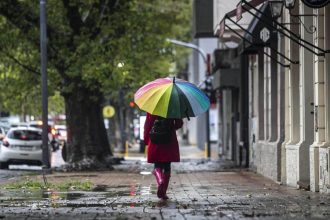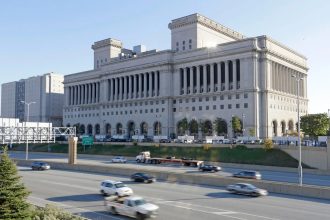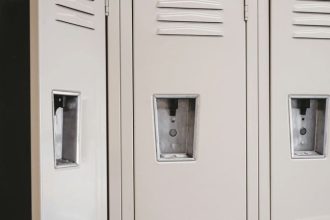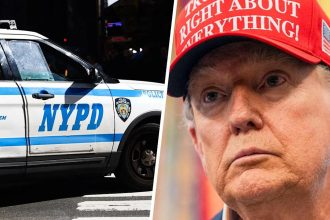A federal appeals court gave a chilly reception Tuesday to President Donald Trump’s bid to revive a sprawling racketeering lawsuit accusing his perceived political foes — including Hillary Clinton and James Comey — of conspiring to tar him with false allegations that he collaborated with Russia.
A three-judge panel sitting in Birmingham, Alabama, also heard arguments over a nearly $1 million penalty a court imposed on Trump and his then-attorney Alina Habba for filing and persisting in the lawsuit a judge determined in 2023 to be frivolous.
William Pryor Jr., the chief judge in the 11th Circuit Court of Appeals, made clear near the outset of the session that he believes Trump’s lawsuit — which came in at 108 pages in the first version and 193 in a second attempt — violated federal court rules by vaguely linking too many defendants and too many legal claims.
“I can read this complaint,” said Pryor, a George W. Bush appointee. “It seems a classic shotgun complaint. It incorporates, by reference, hundreds of paragraphs into succeeding counts.”
An attorney for Trump, Richard Klugh, urged the panel to conclude that the lawsuit filed in 2022 was not doomed by statute-of-limitations concerns. He said that Congress provided for extending the filing period under certain conditions and that someone serving as president as Trump was from 2017 to 2021 should be allowed “equitable” extra time.
Klugh also argued that participants in the alleged conspiracy took steps to cover their tracks, apparently referring to the Federal Election Commission’s conclusion that the Democratic National Committee and Clinton’s presidential campaign misreported expenses related to a so-called dossier about Trump’s ties to Russia.
The payments at issue were labeled as “legal services” and “legal and compliance consulting” paid to law firm Perkins Coie, but some funds were passed to investigative firm Fusion GPS. The committees agreed to pay total penalties of $113,000, but did not admit wrongdoing.
“The hiding of the motivation, the structure, the payment, the participation, and how the participation was organized, was crucial to initiating the phony Russia collusion investigation. It was, in our view, absolutely fundamental,” Klugh argued Tuesday.
In a scathing 2023 ruling, Florida-based U.S. District Judge Donald Middlebrooks called Trump’s lawsuit “a hodgepodge of disconnected, often immaterial events, followed by an implausible conclusion.”
“This case should never have been brought. Its inadequacy as a legal claim was evident from the start. No reasonable lawyer would have filed it,” wrote Middlebrooks, an appointee of President Bill Clinton. “This is a deliberate attempt to harass; to tell a story without regard to facts.”
At the request of one of the defendants, public relations executive Charles Dolan, Middlebrooks imposed nearly $1 million in sanctions on Trump, Habba and her law firm for filing an unsupported and inaccurate case.
Shortly after Middlebrooks imposed the penalty, Habba shifted from defending Trump in litigation to a new role as a spokesperson for Trump’s legal team.
In March of this year, Trump named her on an interim basis as the top federal prosecutor in New Jersey. When that appointment was set to expire in July, the administration used an unusual maneuver to keep her in the job. A judge ruled in August that the effort to extend Habba’s term was illegal, but the Justice Department is appealing that decision.
Dolan’s lawyer, George Doumar, urged the appeals judges not to disturb the penalty Middlebrooks assessed.
“My client is depicted as some big shot in the Clinton campaign when nothing of the sort was true,” Doumar said. “There’s no factual foundation for putting my client in there. He was, in a sense, a victim of the shotgun pleading.”
Another judge on the appeals panel, Trump appointee Andrew Brasher, suggested Middlebrooks might have erred in dismissing Trump’s claim that he was targeted with “injurious falsehoods” by some of the defendants. Middlebrooks threw out that claim for being based on statements outside the statute of limitations, but Brasher said some of the comments were within the two-year period before the lawsuit was filed.
But the Clintons’ longtime attorney, David Kendall, told the judges that Trump failed to assert that any alleged false statements were intended to damage Trump’s businesses or assets.
“They’ve got to allege that falsehoods were aimed at the plaintiff, to deprive plaintiff of property or business … but the damages alleged here are political in nature, injury to reputation, likability and so forth,” Kendall said.
The appeals panel, which did not immediately rule, also includes Biden appointee Embry Kidd.









